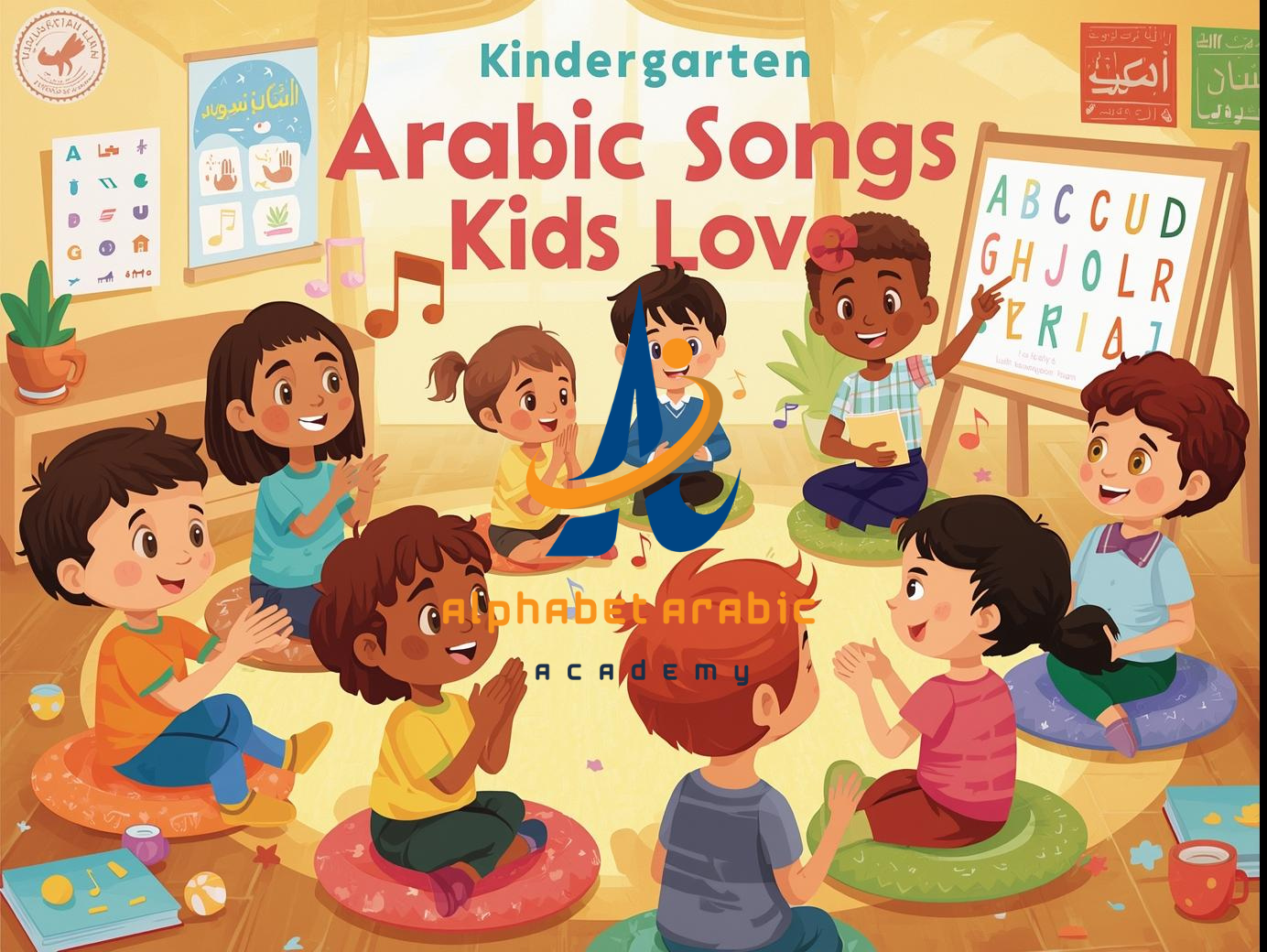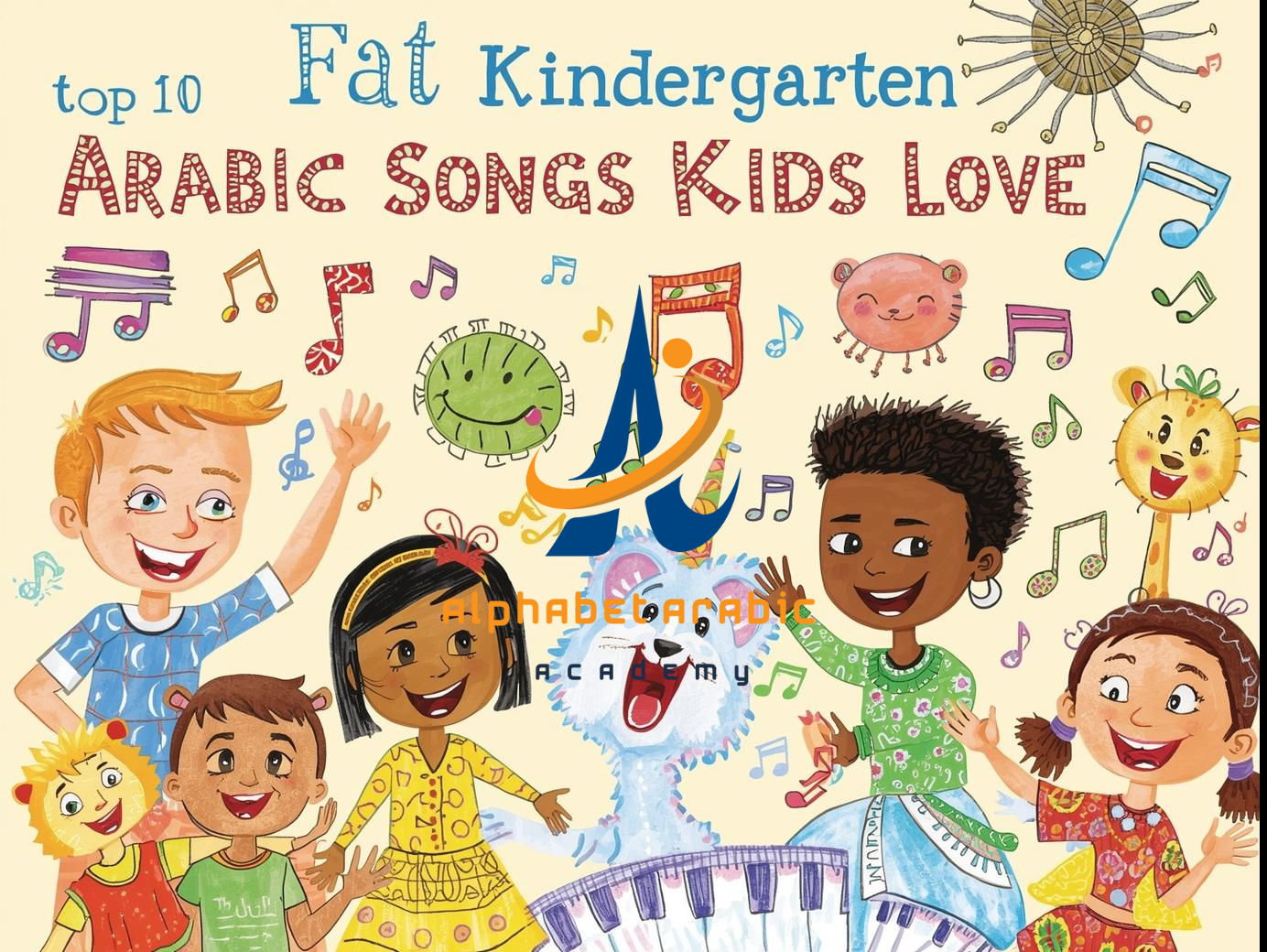Learning Arabic for kindergarten can be an exciting and engaging journey for children. One of the best ways to introduce them to the Arabic language is through songs. Music makes learning Arabic fun, interactive, and effective, helping kids develop essential language skills like speaking, reading, and writing. To ensure your kids love every session, we have developed game-based Arabic lessons for kids that guarantee both laughter and fast progress.

In this article, we’ll explore the benefits of Arabic songs, the top 10 Arabic songs for kids, and how music enhances language learning. Plus, we’ll share valuable resources, including worksheets, printable flashcards, and online lessons that make learning even easier.
Benefits of Learning Arabic online at alphabet arabic academy
Learning Arabic from a young age provides a strong foundation for children to communicate effectively. It improves cognitive skills, enhances cultural understanding, and helps children connect with their heritage.
By introducing Arabic for kindergarten, parents can ensure that their child develops basic language skills early on, making it easier to learn and use the language fluently.
Arabic Kindergarten Near Me online easy way
Are you seeking experienced Arabic instructors? Our academy offers interactive programs designed to teach kids in an engaging and effective way. Whether you prefer online classes or in-person sessions, we have programs tailored to different learning styles.
Arabic Activities for Kindergarten online
Fun activities like games, flashcards, songs, and worksheets help reinforce Arabic learning. These interactive methods make it easier for children to remember new words, understand letters, and improve their language skills.
Arabic Lessons for Kindergarten via expert tutors
Structured lessons help kids build a strong foundation in reading, writing, and speaking Arabic. Our academy offers modern and classical Arabic courses to suit different learning needs.
Arabic Curriculum for Kindergarten cards and sheets
A well-designed Arabic curriculum includes alphabets, common words, simple sentences, and fun activities. It ensures that children progress step by step, making learning enjoyable and effective.
Arabic Letters for Kindergarten from international books
The Arabic alphabet consists of 28 letters, each with a unique shape and pronunciation. Teaching kids through visual aids, games, and worksheets makes learning easier and more engaging.
Arabic Words for Kindergarten with examples
Introducing basic Arabic words helps children build their vocabulary. Words related to family, animals, colors, and numbers are a great starting point.
Arabic Alphabet for Kindergarten
Mastering the Arabic alphabet is crucial for literacy skills. Using flashcards, videos, and songs helps kids recognize and write letters effortlessly.
Arabic Songs for Kindergarten from out platforms
Songs make learning Arabic fun and engaging. With rhymes and repetition, they help children absorb new words easily while enjoying the music.
Top 10 Arabic Songs for Kids with links
Here are 10 popular Arabic songs that children love:
- Alif Baa Taa – A fun way to learn the Arabic alphabet.
- Head, Shoulders, Knees, and Toes – Teaches body parts in Arabic.
- The Days of the Week – Helps kids learn the days in Arabic.
- Numbers Song – A catchy way to learn counting in Arabic.
- The Colors Song – Teaches colors in a memorable way.
- Animal Sounds Song – Helps children learn animal names.
- Family Members Song – Introduces basic family vocabulary.
- The Weather Song – Teaches weather-related words.
- The Opposites Song – Helps kids understand opposites.
- Good Morning Song – A great way to start the day with Arabic.
How Music Enhances Language Skills and practicing
Music helps kids retain words better by using melody, rhythm, and repetition. It enhances listening abilities and pronunciation.
Popular Arabic Song Themes and method
Songs for kids often focus on daily life, animals, numbers, alphabet, and basic conversations. These themes help make learning Arabic more relatable.
Role of Repetition in Songs saying
Repetition reinforces memory and language learning. Singing the same songs multiple times helps children grasp new words and phrases easily.
Engaging Kids with Song Activities online with the teacher
Using games, dance, and visual aids with songs makes learning more enjoyable. Children grasp knowledge more effectively when they are enjoying themselves.
Cultural Exposure Through Music online in lesson
Arabic songs introduce children to the rich culture, dialects, and traditions of the Arab world.
Arabic Songs with Educational Value for your child
Many songs are designed to teach the Arabic alphabet, basic words, and conversation skills.
Online Resources for Arabic Songs and words
Looking for songs online? Below are excellent resources:
- YouTube Channels (like AlifBee & Atfal TV)
- Educational Apps (iOS & Android)
- Printable Worksheets
Parental Involvement in Learning with our reports
Parents play a key role in teaching Arabic at home. Singing along with your child makes learning more effective.
Incorporating Songs into Daily Routine 24/7 available
Adding Arabic songs to your daily routine (morning, bedtime, or playtime) helps kids learn naturally.
Evaluating Song Choice for Learning quickly
Selecting the correct songs is crucial. Look for songs with clear pronunciation, simple lyrics, and educational value.
Understanding Child Preferences in Music from repeatation
Every child has their own individual interests.. Some prefer animated videos, while others enjoy sing-along songs. Conduct trials to ascertain the most effective methods!
FAQs
What are the benefits of Arabic singing for kids?
Songs help improve language skills, memory, and pronunciation, making learning Arabic more enjoyable.
How often should kids listen to Arabic songs?
Daily exposure is best. Even 10-15 minutes a day can make a big difference.
Are there free resources for Arabic learning songs?
Yes! YouTube, apps, and educational websites offer free Arabic songs for kids.
Should parents learn Arabic songs too?
Absolutely! Singing along helps reinforce learning and strengthens the parent-child bond.
What age is ideal to start Arabic for kindergarten?
It’s best to start as early as 3-5 years old for effective learning.
👉 Embark on your child’s journey of learning Arabic today!

